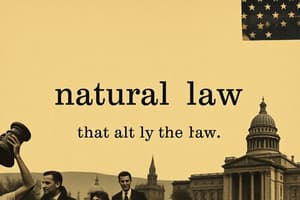Podcast
Questions and Answers
What is the concept of law?
What is the concept of law?
Ordinance of reason promulgated for the common good.
Which of the following is a classification of law according to promulgation?
Which of the following is a classification of law according to promulgation?
- Civil Law
- Natural Law (correct)
- Criminal Law
- Positive Law (correct)
Natural Moral Law applies to both higher and lower faculties.
Natural Moral Law applies to both higher and lower faculties.
False (B)
What is an example of Divine Positive Law?
What is an example of Divine Positive Law?
What is Human Positive Law according to Sanchez Roman?
What is Human Positive Law according to Sanchez Roman?
How are laws classified according to what they establish?
How are laws classified according to what they establish?
What is mandatory law?
What is mandatory law?
A law becomes effective only when it is _______ by the competent authority.
A law becomes effective only when it is _______ by the competent authority.
What is a bill in the context of law-making?
What is a bill in the context of law-making?
Flashcards are hidden until you start studying
Study Notes
Concept of Law
- Law is defined as an ordinance of reason established for the common good.
- For law to be effective, it must be made known to those expected to follow it.
Classification of Law According to Promulgation
-
Natural Law: Implied in conscience and nature.
- Natural Moral Law: Pertains to higher faculties; emphasizes the pursuit of good and avoidance of evil.
- Law of Nature: Affects both higher and lower faculties; exemplified by natural phenomena like gravity.
-
Positive Law: Explicitly promulgated by authority.
- Divine Positive Law: Established by divine authority, such as the Ten Commandments.
- Divine-Human Positive Law: Inspired by divine authority, including Catholic Church doctrines.
- Human Positive Law: Created by human authorities, encompassing statutes and executive orders.
Human Positive Law
- Defined by Sanchez Roman as a rule of conduct that is just, obligatory, promulgated by legitimate authority, and for common benefit.
- Emphasized by Justice Edgardo L. Paras as a reasonable rule that may enforce sanctions for disobedience.
- Influenced by various legal traditions, including Roman, Spanish, American, international law, local customs, and Islamic laws.
Classification of Human Positive Law
-
According to Establishment:
- Substantive Law: Defines rights and duties.
- Remedial or Procedural Law: Dictates the enforcement of legal rights and claims.
-
According to Scope or Content:
- Private Law: Governs relationships between community members; includes civil and commercial laws.
- Public Law: Regulates interactions between individuals and the state; covers political, criminal, and remedial laws.
-
According to Force or Effect:
- Mandatory Laws: Must be followed, reflective of public policy, with penalties for non-compliance; criminal violations typically result in imprisonment or fines.
- Permissive Laws: Allow for deviations at the individual's discretion.
Effectivity of Philippine Laws
- A law must become effective to be useful; five requisites for ordinary laws to take effect in the Philippines include:
- Approval by competent authority, which can take forms such as Acts, Republic Acts, or Executive Orders.
Law-Making Process
- Bill Introduction: Proposed by any member of Congress, except certain measures limited to the House of Representatives.
- First Reading: Brief reading of the bill’s title; referral to a committee.
- Committee Process: Bill can be terminated or recommended for approval; may involve public hearings.
- Second Reading: Full reading of the bill; scrutiny, debate, and possible amendment.
- Third Reading: Voting occurs without further debate.
- Transmittal: Approved bill moves to the other legislative chamber, undergoing a similar process.
- Compromise Measures: If discrepancies arise, a conference committee drafts a compromised version.
- Enrollment and Authentication: Final bill printed, signed by legislative leaders, and submitted to the President.
- Presidential Decisions: The President can approve (sign), veto (reject), or allow a bill to lapse into law without action.
Studying That Suits You
Use AI to generate personalized quizzes and flashcards to suit your learning preferences.




